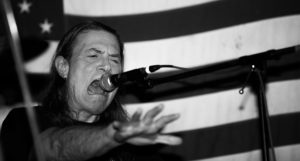 Rick Berlin, 75, piano player, singer, and band leader has been on the Boston music scene since the early 1970s. Aside from his storied and varied career, Berlin, like many residents of the planet, had to come to grips with his sexuality and how it shaped his perception of himself.
Rick Berlin, 75, piano player, singer, and band leader has been on the Boston music scene since the early 1970s. Aside from his storied and varied career, Berlin, like many residents of the planet, had to come to grips with his sexuality and how it shaped his perception of himself.
“One’s sexuality informs one’s view of the world,” Berlin said. “On the other hand, I’ve always considered myself Rick, first; artist, second; and gay, third. Some of my songs have pronouns that would imply man to man live. Others are more universal. In some ways there’s no difference. You love or you don’t.”
“I think there’s an advantage for anyone who has a cross to bear at an early age,” he continued. “It gives them empathy if they learn from it. For someone like myself who was in the closet up until my early 20s, it was something I had to work through. It was not an easy thing. It was despairing at times. It gave me a kind of strength of self and a sense of pain in others that I’m grateful for. Others have had a lot worse to deal with dealing with their sexuality. It didn’t stop me from being an honest person and an optimistic person.”
Berlin never felt ostracized by the rock and roll scene that has its share of macho posturing. That was because rock and roll means different things to different people.
“My first band was in lot of ways the gayest band I ever had. It’s also the most memorable, most remembered, and most beloved. I think that rock and roll is anything you want it to be, from The Boss to Bowie, which are extremes. In my case because my voice was more Broadway than rock, I sort of falsified my behavior and my performance.”

Rick Berlin
Berlin eventually transformed from the more flamboyant initial band Orchestra Luna to the more heterosexual seeming rock and roll band Berlin Airlift.
“At the same time, during Luna and Airlift my boyfriend was in the band, for better or ill. You can wear leather pants, but you’re still a fagot. I think there’s a lot of homoeroticism in rock and roll. If you look at an Andy Warhol record cover with a banana. It allows a heterosexual person to react and to do on stage thinks considered attractive or powerful that is vaguely erotic and fake. On one hand there is all that posturing and on the other hand, it’s all made up, what you wear, how you sing.”
While Berlin was fronting the hugely flamboyant Luna Orchestra, he was never a pride carrier. He’s joined some pro-gay marches and he has showed up at some pro-gay rallies. He is more of an artist than an activist.
“My activism is more personal than it is political in terms of civil rights. But, yes. Thank God people took a stand. But, I was just wandering around on the periphery like I always have, in the margin of the mainstream, as an artist and as a person.”
Berlin’s band Berlin Airlift started out strong in 1981 with airplay and label support. Yet, the Airlift crashed to the ground due to bad timing.

Rick Berlin
“The label went bankrupt as the record came out,” he said, chuckling. “We got no support, no tour. The airplay that we got locally was because WBCN loved the band and (manager) Billie Best did a really good job with her relationship to the industry locally.”
Berlin eventually moved onto another band, Rick Berlin The Movie. The Movie band involved a lot of missteps. Drugs were involved back then and Berlin’s relationship with his boyfriend was on the rocks.
“At a certain point it just devolved,” Berlin said. “It’s difficult to sustain a band that has men and women in it because it has conflicting emotions and needs. The Movie had four women and they were all incredible artist, singers. But the one that last throughout was Jane Mangini. Jane still does all the keyboard stuff on my records. She’s a very dear and close friend of mine.” Mangini is also the keyboardist with international touring group Trans-Siberian Orchestra.
Berlin, at that point, couldn’t play the piano any longer because he hadn’t played his instrument in a long while. A friend had him baby sit his tarantula while he was in Europe. The friend, a piano player, had a Spinet in his apartment so Berlin stared writing, creating a rediscovery of the innocence of the initial time he wrote songs for the fun of it.
“It came to too much of a drama scene,” Berlin said. “That started a whole thing, a ten year period, just piano and voice.”
Despite having some education at Yale University, some scholarships for further Yale programs, and teaching at Boston Technical School, Berlin opted to become the most popular waiter at now defunct Tommy Doyle’s in the Jamaica Plain area of Boston. His perennial keyboard player Jane Mangini was already working at Doyle’s and she invited him to come down to talk to a manager.

Great Big House cover
“(manager)Bonnie put me on the floor,” Berlin recounted. “That was 31 years ago. It was fun. It gave me enough money to support my life and to support my art. I don’t spend money on things like vacations. I haven’t had a vacation since the 90s. I just loved it. I loved the socialization of it. I loved the guys in the kitchen. I loved all my co-workers, 99% of them. I loved the regulars. It was not the kind of job I took home with me. When I was out of there, I was outta there. It was five nights a week for 31 years. It was a horror when it ended, but it did.”
Berlin has written some movie scripts that he couldn’t pawn off on any film companies. He did get his first book published by a local bookstore in Jamaica Plain. Papercuts, Cutless Press. He sold a thousand copies of it. He is now working on a second one.
“I didn’t realize it, but I guess I’ve been writing plain old words for a really long time, and I like doing it, and it’s work. My feet got all swelled up for the last several weeks because I’ve been sitting at the damn computer with my legs dangled down.”
When Berlin came back into the music scene 11 years ago, he went solo under his own name because it was an unfamiliar open door. After the solo period, he put on a couple of successful, elaborate fundraisers. Billy Beard, booker at The Lizard Lounge, had asked Berlin to put on a Wednesday evening variety show.
“We had comedians. We had a guy on a bed of nails. We had four or five bands. We had drag queens. We had a Marlene impersonator,” Berlin said.
Berlin’s experience with the Lizard Lounge Wednesday night variety show sort of catapulted him to his role administrating the Jamaica Plain Music Festival as well as his booking, management, and leadership role at Jacque’s Cabaret on Broadway, Boston.
“I played a couple of my songs and then he pretended to play as a drag queen would dance or lip-sync. It was hysterical,” Berlin recalled. “It was really fun and it became kind of a clubhouse.”
Berlin was required, by the act, to come up with two new songs each week, pushing him to write, and then it played itself out with fewer and fewer people turning out. “That’s when I did the Marlene thing, and I went back into having bands again.:”
Berlin’s newest band then was called The Shelly Winters Project which focused on rock and roll songs. The famous film actress Shelly Winters actually called Berlin at Doyle’s to ask why he had named a project after him. He told her: “Several of your best movies you were the woman done wrong. A lot of songs are about women and people who have been hurt.” Berlin, imitating Winter’s said her reply was “Oh, that’s so wonderful.”

with Nickel And Dime Band
Berlin’s latest project is recording his original rock and roll songs with Boston’s Nickel And Dime Band. Nickel And Dime Band was its own separate entity before they and Berlin joined forces. Berlin had seen them perform outside at Hyde Square. They were covering other bands from the radio and Berlin asked them if they wanted to learn a few of his songs.
“We added a new drummer and my nephew joined the band,” Berlin said. Things were happy enough when a woman who had admired Berlin donated a check for ten thousand dollars after seeing his picture in a music magazine. She explained to Berlin that she had come into some money and thought he, as an artist, could use some.”
The money went toward recording the first Nick And Dime Band CD. “The thing about Nickel And Dime is I just love the name of it,” Berlin said. “It could mean almost anything. It’s not pretentious. None of the guys in the band are in it to make it, they’re in it for the fun of it, which is basically the best you can hope for this day and age, especially with some old fart in front. We’ve made five records and we’re starting on a sixth, and I’m proud of them all.:
Nickel And Dime Band’s newest release Great Big House was inspired by a local misfortune, a house fire near Berlin‘s neighborhood. Berlin, three New Year’s Eves ago, was at work at Doyle’s when a bartender from the Midway came running in to announce a house fire at her brother’s. Her brother had lived across the street from Berlin’s house. All residents survived but it was in the middle of a cold dark night. The musician started a GoFundMe so the newly displaced could afford to get another apartment.
“Because so many people lived there, and because so many of their friends contributed money, in some way, it was a victory where there was a huge, humanity big house. It also reminded me of the days when I was first coming across as a songwriter, when I lived in big houses with lots of artists. I just liked the idea.”
For the future, Berlin hopes that after he dies his website remains active and can sell his legacy of recordings and writings.
“The quote I always mention is Jacques Cocteau. He said he wanted to write a book a kid would read under a tree long after Cocteau was dead and the kid would feel less alone.’ I just want to write about something that’s feels relative to me and I’m not ashamed of it. I’ll just keep doing stuff until I can’t do anything any more. Put it out. Put it out Put it out.”

